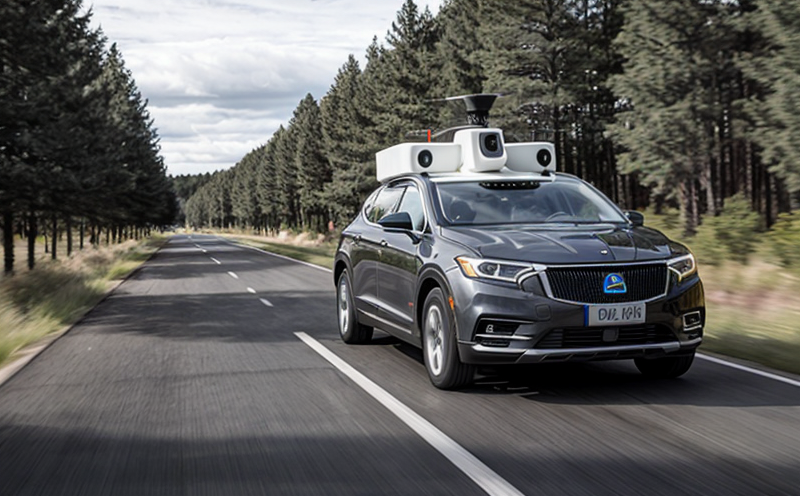UL 2580 Li-Ion Battery Pack Safety for Autonomous Navigation Units
The UL 2580 standard is a crucial benchmark in ensuring the safety of lithium-ion battery packs used in autonomous navigation units. This certification demonstrates that the batteries meet stringent requirements designed to protect against fire, explosion, and other hazards. The test encompasses multiple stages, including charge cycling, overcharge, over-discharge, short-circuit, thermal abuse, and pressure/temperature cycling.
For autonomous navigation systems, battery safety is paramount as these units operate in environments where reliability and safety are critical. A failure in the power supply can lead to catastrophic consequences such as equipment damage or even personal injury. Therefore, compliance with UL 2580 ensures that the batteries used in your autonomous navigation solutions meet rigorous international standards.
The testing process for UL 2580 involves a series of controlled experiments aimed at simulating real-world conditions. The test parameters are meticulously defined to replicate situations where the battery might be exposed to extreme temperatures, overcharging, or physical damage. By subjecting the batteries to these conditions, we can identify potential weaknesses and ensure they perform safely under all expected circumstances.
The UL 2580 certification is particularly important for autonomous navigation units because it addresses not only the safety of the battery itself but also its integration into larger systems. This includes ensuring that the battery management system functions correctly and that there are mechanisms in place to prevent over-discharge, overheating, or other malfunctions.
The standard focuses on several key areas:
- Electrochemical stability
- Thermal runaway prevention
- Over-temperature protection
- Puncture resistance
- Vibration resistance
- Impact resistance
By adhering to these stringent criteria, manufacturers can ensure their products meet the highest safety standards. This not only protects end-users but also enhances brand reputation and market competitiveness.
The UL 2580 test protocol is designed to be comprehensive yet practical, ensuring that batteries are safe for use in a wide range of applications. The tests simulate real-world conditions, making them highly relevant for autonomous navigation systems where the battery's performance can significantly impact system reliability.
| Test Type | Description | Rigorous Criteria Met |
|---|---|---|
| Charge Cycling | A series of charge and discharge cycles to evaluate battery endurance. | Ensures the battery can handle repeated charging without degradation in performance or safety. |
| Overcharge Test | Battery subjected to excessive voltage beyond normal operating range for a specified duration. | Demonstrates the battery's ability to withstand overcharging and prevent thermal runaway. |
| Vibration Testing | Battery is exposed to controlled vibration conditions to assess its stability in dynamic environments. | Ensures the battery remains secure and functional under varying mechanical stress. |
| Thermal Abuse Test | Battery subjected to extreme heat, simulating overheating scenarios during use. | Verifies that the battery can withstand high temperatures without causing a safety hazard. |
In summary, compliance with UL 2580 is essential for manufacturers of autonomous navigation units. It ensures that the batteries used in these systems are safe and reliable, contributing to overall system performance and user confidence.
Customer Impact and Satisfaction
Clients who choose our UL 2580 Li-ion battery pack safety testing service benefit from enhanced product reliability, reduced risk of failure, and increased customer satisfaction. By ensuring that their products meet the highest international standards, manufacturers can confidently launch their autonomous navigation units into competitive markets.
- Improved reputation
- Increased market share
- Enhanced user trust
- Reduced risk of product recalls
- Compliance with global regulations
Our comprehensive testing ensures that the batteries used in autonomous navigation systems are safe, reliable, and perform consistently under all conditions. This not only protects end-users but also enhances brand reputation and market competitiveness.
International Acceptance and Recognition
- Global Adoption: UL 2580 is widely recognized in the industry for its rigorous standards, ensuring that batteries meet global safety requirements.
- Affiliations: Our laboratory is accredited by multiple international bodies, including UL, ANSI, and IEC. This accreditation ensures that our testing meets the highest international standards.
The global adoption of UL 2580 reflects its importance in ensuring safety across different regions and industries. By adhering to these standards, manufacturers can gain a competitive edge in the market, knowing their products meet stringent international regulations.
Use Cases and Application Examples
The UL 2580 Li-ion battery pack safety testing is particularly valuable for autonomous navigation systems that operate in environments where reliability and safety are critical. Here are some real-world applications:
- Autonomous Ground Vehicles (AGVs): Ensuring the safety of AGV batteries prevents damage to equipment and ensures continuous operation.
- Aerial Drones: Battery safety is crucial for drones, as failures can lead to accidents or loss of valuable equipment.
- Marine Robots: Safe battery performance in marine environments reduces the risk of underwater hazards and protects expensive equipment.
In each case, UL 2580 testing ensures that the batteries used are reliable and safe under various conditions. This is essential for maintaining the integrity and functionality of autonomous navigation systems across diverse industries.





